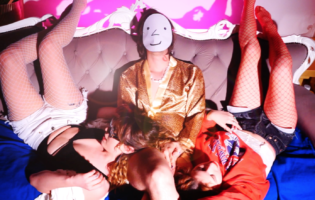The place of women in society, in every society of every time and place, has been a major topic of discussion for the last 60-70 years.
As cliché as it may seem to some nowadays, after three waves of feminism and many ostensible and legislative changes, the question remains perennially unresolved:
What does it mean to be a woman? What does it mean to look like psysically to identify as a woman? What are the differences between a woman and a man? What are her characteristics, what are her needs, what are her obligations and what are her rights?
The place of women in a society and more specifically in a country reveals a lot about the country itself, about its quality and its sustainability. Similarly, the depiction of women in art reveals in a condensed, unconcealed, perhaps more grotesque and sometimes prophetic way what the word WOMAN subconsciously means in any era.It is no coincidence that historically the fate of women and the rate of equality towards the opposite gender, if we accept that there are only two, goes hand in hand with the educational and economic level of society and the political regime prevailing at any given time.
Regarding Greek cinema, the portrayal of women follows a similar course to that of the political situation in post-war Greece and the gradual evolution of the standard of living of the mass of the people.

The «Downfall» of Old Greek Cinema
The film “Katiforos” -literally meaning Downfall-/”Spoiled Rotten” (1961), written and directed by Giannis Dalianidis and produced by Finos Film, is a social drama with strong erotic, sexual and sexist connotations, especially for the time that it was made.
Starring Zoi Laskari and co-starring Nikos Kourkoulos, the film is a very good example of a series of Greek drama films of the 1960s, where the dignity of the woman and especially the young, single woman is the only value in her existence. Films with similar content are:
“Nomos 4000” (1962), “Iligos” (1963), “Stefania” (1966), “Under the Sign of Virgo” (1973),all starring Zoi Laskari, directed by Giannis Dalianidis and produced by Finos Film.
“Downfall”‘s premise, which is more or less the same as in the other films, is the following:
A young woman dares to have sex, to “give herself” to a man, to lose her virginity without first having been married, so she inevitably takes the wrong path, gets humiliated, goes to jail, and ruins herself and her family.
A standard screenwriting and directorial pattern remains unchanged after more than 10 years. At a time when all over the world, social, political, sexual and moral revolutions and fundamendal changes are taking place. Uncensored sex is now everyone’s right and a commodity. But in the Greece of the Civil War and the subsequent Military Dictatorship, the supreme value for a girl is her virginity. Sex is something evil and dirty, a weapon of power of men who use it to dominate women.

The portrayal of women in almost all the films of the Old Greek Cinema is so clearly manipulative that one might wonder whether they echoed the logic of the society of the time or whether they ultimately defined it.
Comparing to my family, my mother who was the age of Rhea, Stefania or Koula in the 70’s, I never felt like she was carrying that stigma. Of course she had never seen those movies as a youngster. On the contrary, I, who started watching these films with my mother on Greek TV on Sunday afternoons, was very much stigmatized by the imagery of these films.
With black-and-white, dramatic film noir cinematography, intense shadows, intense mystery music and tears of anguish from the protagonists, the story of “Downfall” manages to get into the mind of a millennial as something taken for granted in Greek society of the ’60s.
In a general context of intimidation and political, economic and social oppression, especially for non-friends of the regime, women are perhaps the most oppressed member of this society as portrayed in these films:
In melodrama, woman appears as man’s sexual slave, weak and unable to survive without a good marriage, where freedom and respect do not coexist. Pleasure is sinful and leads to ostracism and misery.In comedy, woman is portrayed with all the classic female negative clichés (cunning, tricky, deceitful, lying, wasteful, treacherous, foolish), with the sole aim in life to find a good husband capable of providing her money for fun and entertainment.
Women are incapable of living independently, even if they have their own jobs, they are educated and are ranked above their male colleagues, as in “Miss Director” (1964). In Old Greek Cinema concepts such as deep love, pleasure, freedom and self-respect are loudly absent for a woman.
“The good Old Greek cinema, how good is it, after all?
And for whom?”

“Anna’s Engagement” of New Greek Cinema
The Old Greek Cinema finally closes its cycle with the film “O kyr’ Giorgis ekpaidevetai /Mr George is trained” in 1977, again directed by Giannis Dalianidis and produced by Finos Film. Typically, woman is portrayed as a liar, arrogant, evil, devoid of emotions and full of deceit. Military dictatorship has been down for three years now, but no one from the “old guard” is willing to understand the change in society and the transformation of the role of women, which has been delayed but it is now a fact in Greece.Nevertheless, young directors, mostly of left-wing beliefs, have for years now brought new life to Greek cinema. The most notable among them are Pantelis Voulgaris, Theodoros Angelopoulos and Alexis Damianos. The film “Anna’s Engagement” (1972), written by Menis Koumantareas and Pantelis Voulgaris, directed by P. Voulgaris and produced by Dinos Katsouridis, is a social drama that exposes, without any frills and embellishments, the Greek society during dictatorship, where inequality, oppression and lust for power dominate. And in this case the weakest link is a woman: a young, poor, small-town woman.
The protagonist is Anna, played by Anna Vagena. Anna is a young poor woman from the countryside, who is forced by her family to work as an inhouse maid in a bourgeois family of the capital. A particularly common phenomenon until the post-war period: poor, big families from poor regions of continental Greece and the islands sent their teenage girls to “rich” houses in order to become maids. The benefits were very few: shelter and food, some or no pocket money, in exchange for 24/24, 365/365 work. Upon the good will of the masters was the provision of a dowry for these girls, which they had to give to the future husband of the maid. The husband was chosen by the maid’s masters and he introduced to her just before the engagement.Only this way, a poor girl could leave a house she served in order to keep her name un-tarnished.







